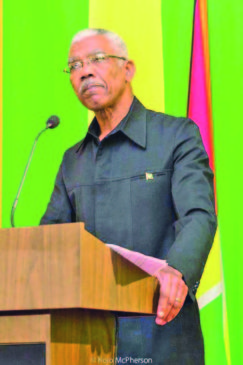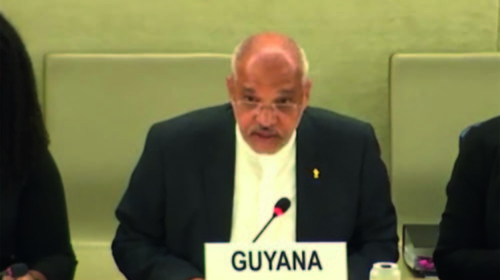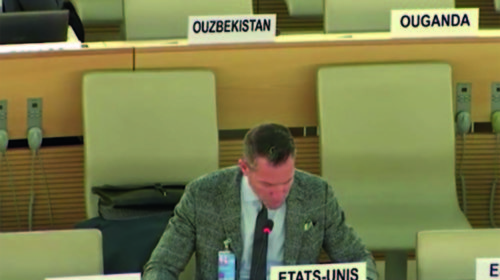
…misapplication of Constitution, court rulings
The United States has rapped the Government of Guyana for undermining democratic principles, including misapplication of the Guyanese Constitution and court rulings.
US representative Sean Mariano Garcia had some tough words for Guyana’s delegation, which was headed by Permanent Representative to the UN, Ambassador John Deep Ford.
Garcia was referring to the successful passage of the No-Confidence Motion and the subsequent onslaught of Guyana’s Constitution by the Government, which disregarded the provisions it needed to adhere.
The US representative conveyed the concern of the US, regarding what transpired last year when elections were supposed to have been held in accordance with the Constitution but were not, as well as the possible effect on democracy.
“The United States recommends that Guyana immediately implement reforms to strengthen electoral procedures and enhance the independence of electoral authorities to ensure that the March 2 elections are free, fair, transparent and credible.”
“The United States is concerned about recent actions by Guyana that may undermine democratic principles, including apparent misapplication of the Guyanese Constitution and certain court rulings,” Garcia also said.
Garcia, in fact, laid out a number of areas that the US would like to see reformed in Guyana. In his response to the comments on elections, Ambassador Ford maintained that the Guyana Elections Commission (GECOM) is an independent entity.
Guyana’s human rights record also came under scrutiny on Wednesday before the United Nations Human Rights Council.
Guyana’s 3rd review was held in Geneva, Switzerland. In his presentation, Ford noted that there have been several challenges to Guyana meeting some of its obligations.
“These are challenges related to Guyana’s geographic dispersion, multicultural population and economic and environmental vulnerability. Guyana is a small country, with a population estimated at 750,000, where 90 per cent of the people live on a strip of coastland that represents 10 per cent of the country’s landmass.”

“The remainder live in what is described as hinterland regions. Guyana is divided into 10 administrative regions, with several of these being remote and not easily accessible,” Ford said, going on to, nevertheless, cite the strides that the country has made on a cultural front. He used the establishment of the Social Cohesion Ministry to bolster his argument.
Ford also pointed out that Guyana, like other Caribbean countries, is exposed to the effects of climate change, protectionism and other risks. Ford also cited the regional financial stipulations that negatively impact the country’s access to capital.
“Regulations that negatively impact (Guyana’s) access to capital resources. More recently, the Government is actively responding to increased migration flows from countries in the region. These economic, social, and natural environment challenges have the tendency to narrow the fiscal space necessary to enact reforms and address all the needs of our population”.
According to Ford, Guyana has, nevertheless, tried to provide human development services to all regions.
Guyana is one of the 14 States being reviewed by the UN Universal Periodic Review (UPR) Working Group during its 35th session. A number of human rights issues are usually addressed, including the level of democracy afforded to citizens.
Guyana has previously faced criticism over delayed elections, despite a no-confidence vote being passed. Last year, several countries and organisations expressed concern over the lack of an election date. After much pressure both locally and internationally, President David Granger named March 2 as E-Day.
But while Granger did name March 2, 2020, as the date for elections, the Constitution of Guyana stipulates that elections must be held within three months of the passage of No Confidence Motion.
The No-Confidence Motion was passed against the Government since December 2018. After failing to overturn the motion at the parliamentary level the next month, the Government then embarked on a series of court cases in which it argued, among other things, that 33 was not the majority of 65 but rather, 34.
Those arguments too have been thrown out by the Caribbean Court of Justice. The CCJ subsequently ordered that elections be held as stipulated by the Constitution. The CCJ decision was given on June 18, 2019 and paved the way for elections. In keeping with the constitutional three-month provision, this means General and Regional Elections should be held on or before September 18, 2019. That too was not done by the seating caretaker Government.




